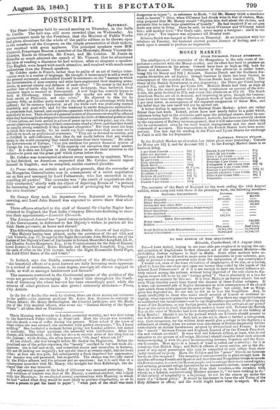POSTSCRIPT.
SATURDAY.
The peace Congress held its second meeting on Thursday, in the Salle St. Cecille. The hall was still more crowded than on Wednesday. An announcement made by the President, that the Minister of Public Works bad given directions for the whole of the public edifices to be thrown open to the members of the Congress, on the simple presentation of their tickets, eras received with great applause. The principal speakers were MM. Coquerel, Francisque Bouvet, a member of the Mountain, Henry Vincent the Chartist, Emile de Girardin, Mr. Ewart, and Mr. Cobden. M. Emile de Girardin so much admired the speech of Mr. Vincent, that he abandoned the idea of reading a discourse he had written, after so eloquent a speaker. The English were heard with much attention, and received with much more enthusiasm than the French speakers. Mr. Cobden spoke in French, rather than be guilty of an act of foreign inter- vention even in a matter of language. He thought it unnecessary to add a word to the general argument, and confined himself to comments on the "manner in which the Governments of your country and mine have augmented their standing arma- ments, in mutual rivalry and defiance of each other." " No sooner is the keel of another line-of-battle ship laid down in year dockyards, than forthwith fresh hammers begin to resound at Portsmouth. A new forge has scarcely begun to work at Cherbourg, when immediately the sparks are seen to fly from fresh anvils at Plymouth, and vice versa." He objected to this for its supreme folly, as neither party would let the other gain an advantage while both suffered; for its extreme hypocrisy, as all the while each was professing mutual friendship and good-will; and fur the tendency to excite dangerous animosities, to perpetuate fear, hatred, and suspicion—passions which find their gratification in- stinctively in war. Their object of a general system of disarmament would be effected when they had taught the respective Governments the little arithmetical problem that "if two nations are both armed in a time of peace np to a certain point, say six, they are not relatively stronger than if their armaments suede three, and that they would be equally strong relatively if they disarmed altogether." But they must not hope to teach this lesson easily, for he could say from experience that no men are so difficult to teach as professional statesmen. They are so devoted to routine, and so fortified in self-sufficiency, that they do not easily believe that any wisdom exists in the world excepting that which radiates from their bureaus." He asked the Governments of Europe, "Can you continue the present financial system of Europe for ten years longer? With scarcely one exception they must answer, "No." It is then not Utopian in this Congress to arouse their attention to the subject—to point out the great gulf which yawns before them.
Mr. Cobden was interrupted at almost every sentence by applause. When he had finished, an American requested that Mr. Cobden should repeat himself in English; and he complied, amidst renewed plaudits.
La Presse states, on certain and positive grounds, that the surrender of the Hungarian Generalissimo was in consequence of a secret negotiation set on foot and managed by Lord Palmerston; who has succeeded in re- conciling all parties! The surrender was " the result of negotiations skil- fully conducted," chiefly with the object of depriving Russia of " a pretext for increasing her army of occupation and of prolonging her stay beyond her own frontiers."


























 Previous page
Previous page